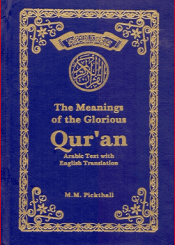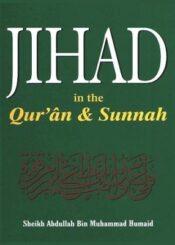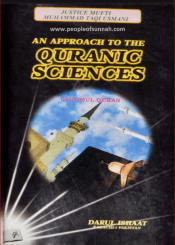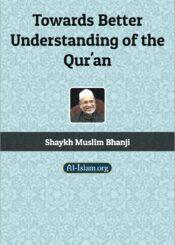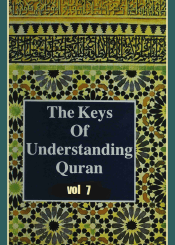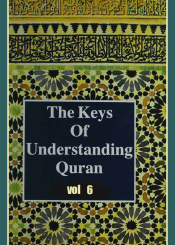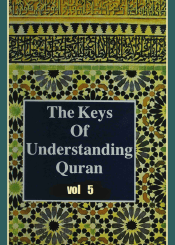A Commentary on The Holy Qur'an

A Commentary on The Holy Qur'an
Author :
Publisher :
Publish number :
first
Publication year :
2000
Publish location :
Qom
Number of volumes :
1
ISBN :
1546864490, 9781546864493
(0 Votes)

(0 Votes)
A Commentary on The Holy Qur'an
Foreword
by Hojjatol-Islam Maulana Syed Shamin-us- Sibtain Rizvi
This short treatise is a brief introduction, by two eminent scholars, to the Shia interpretation of Islam. The theme running through the book is that the Holy Prophet Muhammad named the Holy Family, the Ahlul Bait (consisting of the Lady Fatema and the Twelve Imams - of whom Ali is the first) as the true guardians of the Book and of the Faith, and identified them closely with the Holy Qur'an.
This book examines and discusses the many traditions about the its present arrangement was completed during the lifetime of the Holy Propht.
The authors provide a very useful guide to the meaning of Islam, placing it in the context of the other world relingions. This is followed by an introduction to the beliefs of Shia Islam and a short account of some of the principal truths of the Faith.
This revision was commissioned by Haj Mirza Mohammad taqui Ansariyan of Ansariyan Publications, Qum, Islamic Republic of Iran. His concern for the propagation of the faith is highly appreciated and honoured.
S.S.S.R. 19 May 1996 1 Muharram 1417 30th Urdi Bahesht 1375
Introduction
The Age of Rapid Change
This is the age of the conquest of time and space. Faster means of communication have brought changes to the movement of men and materials far beyond the imagination of former generations. Such ease of communication has brought revolutionary changes in ideology and mode of living and a new economic interdependence of nations. No nation in the world can remain in isolation if it hopes to advance in its economic and social life. Problems have ceased to be local, and the problems of one nation very soon have an impact upon the international community.
Such rapid change has affected not only the economic structure of the world; it has brought a more vital change in the exchange of thought and religious ideology. Economic and cultural forces always go hand in hand. However, while exchange in goods is a two-way traffic, in the cultural sphere this may not be the case. The conveyance of men and materials is visible, but the exchange in ideology is latent, visible only in its effects.
In this respect, there is no give and take. The groups with the greater political and economic power are bound to wield a stronger' and a more compelling influence upon the weaker and poorer groups, leading to a revolution in the latter's intellectual and social life which is irresistible and which defies all reason. The West, with its economic superiority and its political position, has gained sway over most of the Eastern countries.
Muslim communities have been constantly and strongly influenced by materialist thought and lifestyle, to the extent that some have become not only irreligious, but anti-religious. A knowledge of the English language, which is seen to be necessary for the welfare and improvement of economic and political life, has led many Muslims to neglect to learn their own mother tongue and the languages of the Holy Qur'an, Arabic and Persian.
Such Muslims whose education comes through the medium of English can read and understand material presented in the English language better than in their mother tongue, and even books on the Holy Qur'an and on their faith have an appeal for them only if they are In English. Such people care more for the beauty of the language than for the correctness of the material expressed.
Many Western translators of the Holy Qur'an and most of those who produce literature on Islam In the English language are, in fact, the anti-Muslim elements whose aim is to distort the facts about the faith and cause confusion about Islamic belief These hostile elements continue to blacken the name of the Holy Prophet and of Islam through their intentional mistranslations, misinterpretations, misrepresentations and distortions of the facts.
Such distortions are framed in English of such linguistic excellence and delusive argument that the blind admirers of the English language, being ignorant of the truths of their faith, are easily conditioned to accept what they read, and thus serve the purpose of the hostile producers of these publications.
in so doing, they become agents of the enemy. Had it not been for these writers against Islam and its Holy Founder, God alone knows how many people throughout the world might have embraced the truth. in this way western writers have not only misrepresented Muslim ideology, but have obstructed sincere seekers of the truth from discovering the real Islam.
While these hostile elements continue to distort our religious belief and social traditions, it is our duty to God and His Word, and to the faith of Islam, to present the truth and make it clear to every true seeker and to dispel any doubts created by hostile forces.
Source: alhassanain.com
